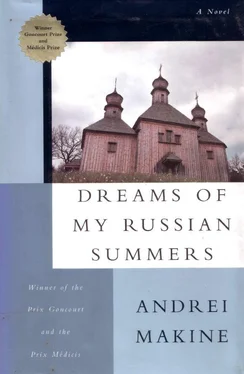Never before had she felt so close to that soil.
During the first months of the war her sleep was punctuated by an endless procession of mutilated bodies, whom she cared for, working fourteen hours a day. In this town, a hundred kilometers from the front line, they brought in the wounded by the trainloads. Charlotte often went to the station with the doctor to meet these trains filled with torn human flesh. She would then sometimes notice on the parallel track another train, filled with freshly mobilized soldiers, setting off in the opposite direction, traveling toward the front.
The round of mutilated bodies did not stop even in her sleep. They passed through her dreams, gathered at the frontier of her nights, waiting for her: the young infantryman with his lower jaw torn off and his tongue hanging out over dirty bandages; another without eyes, without a face… But chiefly all those, ever more numerous, who had lost both arms and legs – horrible limbless trunks, eyes blinded by pain and despair.
Yes, it was these eyes in particular that tore the fragile veil of her dreams. They formed constellations, twinkling in the darkness, followed her everywhere, spoke to her silently.
One night (endless columns of tanks were crossing the town) her sleep was more fragile than ever – a series of brief moments of oblivion followed by reawakening amid the metallic cackling of tank tracks. It was against the pale background of one of these dreams that Charlotte suddenly began to recognize all these constellations of eyes. Yes, she had seen them before, one day in another town. In another life. She woke, surprised at no longer hearing the slightest sound. The tanks had left the street. The silence was deafening. And in that dense and mute darkness Charlotte saw again the eyes of the wounded of the Great War. Her time in the hospital at Neuilly suddenly seemed nearer. "It was yesterday," thought Charlotte.
She got up and went to the window to close it. She stopped in mid-gesture. The white storm (the first snow of this first winter of the war) was carpeting the still black earth in great flurries. The sky, stirred by the waves of snow, drew her thoughts to disturbing profundities. She thought of men's lives. Of their deaths. Of the existence somewhere beneath this tumultuous sky of beings without arms or legs, of their eyes open in the night.
And then life seemed to her like a monotonous sequence of wars, an interminable dressing of ever-open wounds. And the crashing of steel on wet paving stones… She felt a snowflake land on her arm. These endless wars, these wounds, and yes, secretly lying in wait in the midst of them, this moment of the first snow.
The stares of the wounded were blotted out in her dreams only twice during the war. The first time when her daughter fell ill with typhus, and bread and milk had to be found at any cost (they had been eating potato peelings for months). The second time was when she received a notification of death from the front… Arriving at the hospital in the morning, she remained there all the night, hoping to be overcome with tiredness, afraid of going home, of seeing the children, of having to speak to them. Around midnight she finally sat down beside the stove, her head against the wall, closed her eyes, and at once began walking along a street… She heard the pavements echoing in the morning, breathed the bright air of a pale, oblique sun. As she walked through this still-sleeping town, at each step she recognized its simple topography: station café, church, market square… She felt a strange joy in reading the street names, in observing the glint of the windows, the foliage in the square behind the church. The person walking beside her asked her to translate one of these names. Then she realized what had made this stroll through the early morning town such a happy one…
Charlotte emerged from sleep with her last words spoken there still moving her lips. And when she understood the complete improbability of her dream – herself and Fyodor in that French town on a bright autumn morning – when she grasped the absolute unreality of this walk, which was nevertheless so simple, she drew a little rectangle of paper from her pocket and read again for the hundredth time the death printed in blurred letters; and her husband's name written by hand in purple ink. Already someone was calling her from the end of the corridor. The new train of wounded was about to arrive.
"Samovars!" That is what my father and his friends in their nocturnal conversations sometimes called these soldiers without arms or legs, these living trunks in whose eyes all the world's despair was concentrated. They were samovars, yes: with bits of thigh that resembled the feet of those copper vessels and stumps of shoulder that looked like the handles.
Our guests spoke of them with an odd mixture of bravado, mockery, and bitterness. The irony and cruelty of the term "samovar" signified that the war was long over, forgotten by some, of no interest to others, to us, the young – born a decade after their victory. And so as not to seem pitiful, it seemed to me, they talked about the past with this rather coarse flippancy, believing in neither God nor the devil, as the Russian saying has it. It was much later that this cynical tone was to reveal its true secret to me: a "samovar" was a soul imprisoned in a lump of amputated flesh; a brain detached from its body, a feeble gaze trapped in the spongy stuff of life. It was this tortured soul the men called a "samovar."
For them, telling the story of Charlotte's life was also a way of not displaying their own wounds and suffering. All the more because her hospital, with its jumble of hundreds of soldiers, coming from all fronts, condensed innumerable destinies, brought together so many personal histories.
For example, there was the soldier who always made an impression on me with his leg stuffed with… wood. A shell fragment embedded below his knee had crushed a wooden spoon that he had been carrying down the length of his boot. The wound was not serious, but all the debris had to be extracted. "All those splinters," Charlotte had said.
Another wounded man complained all day long that beneath the plaster his leg was itching "enough to tear your guts out." He writhed, scratching at the white carapace, as if his nails could reach through to the wound. "Get it off," he implored. "It's eating into me. Get it off or I'll smash it with a knife myself." The chief doctor, who did not lay down his scalpel for twelve hours a day, took no notice, believing he was dealing with a whiner. "The samovars never complain," he said to himself It was Charlotte who finally persuaded him to cut a little opening in the plaster. It was also she who, with tweezers, drew white worms from the bloody flesh and washed the wound.
Everything in me revolted at this story. My body shuddered at the image of decay. I felt the physical touch of death on my skin. And, wide-eyed, I observed the adults who were amused by these episodes, which were all one to them: wood splinters in a wound or worms…
And then there was that wound that would not close. Yet the scar tissue was forming well, and the soldier, calm and serious, remained lying down, unlike others who, scarcely had they been operated on, started to limp about the corridors. The doctor would bend over this leg and shake his head. Beneath the dressing the wound, which the previous day had been covered by a fine glaze of skin, was bleeding again, its dark edges resembling torn lace. "Bizarre," the doctor remarked in surprise, but he could not tarry there any longer. "Make another dressing," he said to the duty nurse, threading his way between the closely packed beds… It was the following night that Charlotte, unintentionally, surprised the wounded man. All the nurses wore shoes with heels that filled the corridors with a busy clatter. Only Charlotte, in her felt bootees, moved noiselessly. He had not heard her come in. She entered the dark room and stopped near the door. The silhouette of the soldier, sitting on his bed, stood out distinctly against the windows lit by the snow. It took Charlotte several seconds to guess: the soldier was rubbing his wound with a sponge. Rolled up on his pillow were the dressings he had just removed… In the morning she spoke to the head doctor. Having had a sleepless night, he stared at her as if through a fog, not understanding. Then, shaking himself out of his torpor, exclaimed in a harsh voice, "What do you want done about it? I'll telephone them at once, and they can take him away. It's self-mutilation…"
Читать дальше












